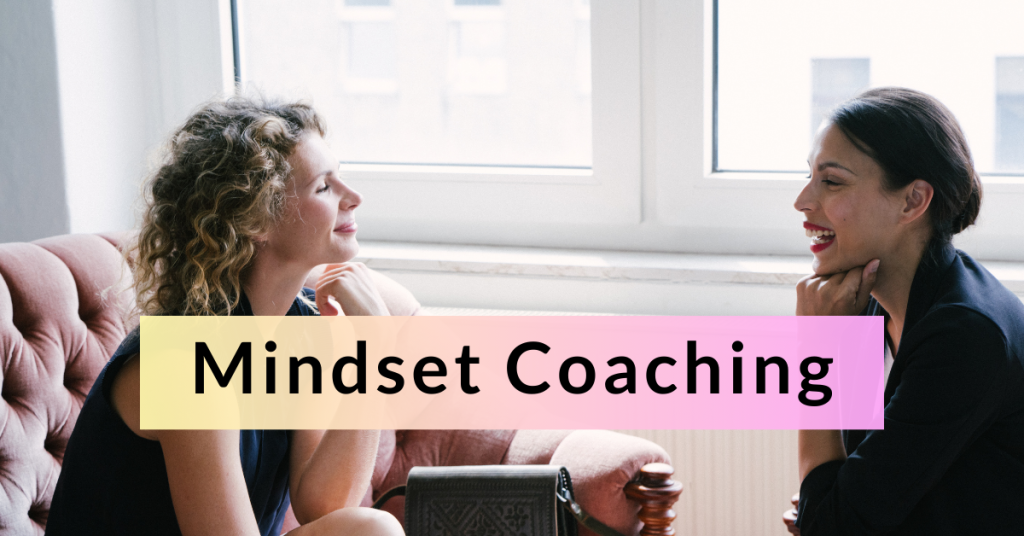Unlock the untapped potential with the transformative power of mindset coaching!
It’s not just about changing thought patterns – it’s about reshaping the perception of reality and empowering coachees to transcend boundaries.
In this post, you will learn the practical strategies and effective techniques of mindset coaching.
Get ready to delve into a journey of self-discovery and growth. Uncover how to utilize these tools to inspire a shift in yourself and those you coach.
In This Post
- 1 What is Mindset Coaching?
- 2 Key Concepts and Principles of Mindset Coaching
- 3 What are the core techniques used in mindset coaching?
- 4 7 Practical Mindset Coaching Exercises
- 5 7-Step Mindset Coaching Process
- 6 How to Implement Mindset Coaching Effectively
- 7 How to Overcome Common Challenges
- 8 What are some examples of how to use mindset coaching?
- 9 Evidence-Based Research and Studies
- 10 Potential Limitations and Criticisms
- 11 Frequently Asked Questions
- 12 Takeaway
- 13 Earn a Mindset Coaching Certification
What is Mindset Coaching?
Mindset coaching is a transformative process that challenges and evolves how individuals perceive their world.
It also fosters an empowered, growth-oriented outlook, enabling individuals to break free from limiting thoughts and behavioral patterns.
A mindset coach provides the tools and guidance needed for this transformation, helping individuals overcome obstacles and reach their full potential.
In addition, mindset coaching helps individuals cultivate a more resilient and positive approach to life’s challenges.
History of Mindset Coaching
The history of mindset coaching, especially in relation to coaching limiting beliefs, is intertwined with the evolution of cognitive psychology.
In the mid-20th century, pioneer psychologists like Aaron T. Beck began to focus on the role of thoughts in shaping our emotions and behaviors.
This led to the development of cognitive therapies, highlighting the importance of recognizing and transforming negative thought patterns.
Over time, these principles were incorporated into the field of personal development and life coaching, giving birth to mindset coaching.
The seminal work of Carol S. Dweck, particularly her research on “growth mindset” versus “fixed mindset,” has been instrumental in shaping contemporary mindset coaching.
Dweck’s theories emphasized the capacity of individuals to change and develop through effort and learning, challenging previously held limiting beliefs.
Today, mindset coaching continues to draw on these foundational principles, offering strategies to overcome limiting beliefs and fostering a growth-oriented mentality.
Key Concepts and Principles of Mindset Coaching
Mindset coaching is grounded in several key concepts and principles that guide its practice.
- Power of Self-Belief: A fundamental concept in mindset coaching is that self-belief influences one’s ability to overcome limiting beliefs. Consequently, the stronger the belief in one’s abilities, the more likely an individual will strive to overcome obstacles and reach their potential.
- Mindfulness: Mindfulness is an essential tool in mindset coaching, allowing individuals to become aware of their thoughts and feelings, recognize habitual patterns, and create space for new responses.
- Reframing: Coaches use reframing to help individuals view challenges from different perspectives, transforming perceived obstacles into opportunities for growth and learning.
- Neuroplasticity: This principle highlights the brain’s ability to change and adapt as a result of experience. It’s a cornerstone of mindset coaching as it emphasizes the brain’s capacity to rewire itself. It also helps individuals understand they can change their thoughts and behaviors.
- Spheres of Influence: This concept involves identifying areas in an individual’s life where they have direct, indirect, or no control. Individuals feel more empowered and less overwhelmed by focusing on areas they can influence.
- Growth Mindset: The growth mindset is a belief that individuals can improve and grow through effort and learning. This concept is fundamental to mindset coaching, as it encourages coachees to see challenges as opportunities for growth rather than impossible obstacles.
- Self-Awareness: Mindset coaching aims to increase the individual’s self-awareness. It helps individuals understand their thoughts, beliefs, and emotions. This increased awareness is a stepping stone to altering fixed mindsets and fostering personal growth.
- Positive Thinking: Positive thinking is a key principle in mindset coaching. It aids in building resilience, which is crucial for maintaining a proactive approach towards life’s ups and downs. This proactive mindset enables individuals to see beyond their limitations and harness their potential.
- Accountability: A key role of a mindset coach is to hold individuals accountable for their actions and progress, fostering commitment to the process of change.
These principles shape the practice of mindset coaching, thus guiding individuals toward a more empowered and growth-oriented life.
What are the core techniques used in mindset coaching?
Mindset coaches use a variety of techniques, including:
- cognitive restructuring
- neuro-linguistic programming (NLP)
- visualization
- affirmations
- journaling
- mindfulness
- positive psychology
These methods help clients reprogram their thinking patterns and build long-term confidence.
7 Practical Mindset Coaching Exercises
Here are some easy-to-follow exercises that you can employ to practice mindset coaching techniques in your own life:
1. Mindset Journaling:
This exercise encourages self-reflection and self-awareness.
- Each day, take 10-15 minutes to journal about your thoughts, feelings, and reactions to the events of the day.
- Pay special attention to any thoughts that reflect a fixed mindset, such as “I can’t do this” or “This is just how I am.”
- Challenge these thoughts and try to reframe them in a growth mindset context, like “I can learn to do this” or “I can change and grow.”
2. Growth vs. Fixed Mindset Identification:
This exercise helps recognize and understand the difference between growth and fixed mindsets.
- Create two columns on a sheet of paper, one for ‘Growth Mindset’ and the other for ‘Fixed Mindset.’
- Recall situations from the past week and write them down in the appropriate column based on your response.
- Reflect on the events in the ‘Fixed Mindset’ column and brainstorm ways you could have approached them with a growth mindset.
3. Positive Affirmations:
This exercise nurtures self-belief and confidence.
- Write a list of positive affirmations that resonate with you, such as “I am capable of learning new things” or “I embrace challenges as opportunities for growth.”
- Read these affirmations aloud to yourself every morning to start your day with a positive and growth-oriented mindset.
4. Visualization:
This exercise is about envisioning your goals and the steps to reach them.
- Visualize a goal that you wish to achieve. Create a detailed mental image, including how it would feel once you’ve achieved it.
- Now, visualize the steps you need to take to reach that goal, including the challenges that might arise and how you can overcome them.
- Practice this visualization regularly to keep your goal and growth-focused approach at the forefront of your mind.
6. Challenging Beliefs Exercise:
This exercise promotes understanding and re-evaluation of limiting beliefs.
- Write down a limiting belief that you hold.
- Ask yourself why you hold this belief and write down your reasons.
- Next, challenge each reason with evidence or reasoning that disputes it.
- Replace your limiting belief with a new, empowering belief. Write this new belief down and affirm it daily to yourself.
7. Belief vs. Fact Exercise:
This exercise helps distinguish between beliefs and facts.
- Make two columns on a paper; one marked ‘Beliefs’ and the other ‘Facts’.
- Write down a belief that’s been limiting you under the ‘Beliefs’ column.
- In the ‘Facts’ column, list evidence that contradicts your belief.
- Compare the columns and determine whether the belief holds any factual basis.
- If it doesn’t, replace it with a new, positive belief that is grounded in fact.
Remember, overcoming limiting beliefs is a process that takes time, patience, and practice. Be kind to yourself throughout this journey.
By incorporating these exercises into your routine, you can gradually cultivate a powerful mindset and empower yourself to overcome challenges and achieve your goals.
7-Step Mindset Coaching Process
The mindset coaching process involves the following steps:
- Initial Assessment: This is the introductory phase where the coach and the coachee establish rapport. The coach gathers information about the coachee’s current mindset, challenges, and goals. The objective of this stage is to gain a comprehensive understanding of the coachee’s mental and emotional state, thereby paving the way for a targeted coaching approach.
- Goal-Setting: Here, the coach and coachee collaborate to identify and define clear, measurable, and achievable goals. This stage aims to provide a direction for the coaching journey, aligning it with the coachee’s personal and professional aspirations.
- Identifying Limiting Beliefs: The coach guides the coachee in recognizing and acknowledging their limiting beliefs and thought patterns. Activities may include self-reflection exercises and in-depth discussions. The objective is to raise the coachee’s self-awareness, which is a critical first step toward changing their mindset.
- Cognitive Restructuring: This stage involves challenging and adjusting the coachee’s limiting beliefs. Using CBT techniques, the coach helps the coachee to reframe negative thinking patterns into positive, growth-oriented ones.
- Skills Training: The coach introduces and teaches various skills necessary for maintaining a growth mindset, such as stress management, resilience, and emotional regulation. The aim of this stage is to equip the coachee with the tools needed to navigate challenges and setbacks effectively.
- Progress Evaluation: Regular reviews are conducted to assess the progress made toward the coachee’s goals and the effectiveness of the mindset shift. The objective is to ensure the coaching process stays effective and aligned with the coachee’s evolving needs.
- Consolidation and Termination: Once the coachee has achieved their goals and established a consistent growth mindset, the coach and coachee review the coaching journey, consolidating the learning and growth achieved. The aim of this stage is to ensure the coachee feels empowered to continue their growth journey independently.
Each step in the mindset coaching process is designed to gradually nurture a growth mindset and empower coachees to overcome their challenges and realize their full potential.
How to Implement Mindset Coaching Effectively
Mindset coaching can be an empowering tool when implemented effectively. Here are some best practices for coaches or practitioners:
- Establish Trust: Building a strong rapport and trust with your coachees is foundational. It encourages openness and honesty in discussions, which is crucial for a successful coaching process.
- Promote Self-Reflection: Encourage coachees to regularly reflect on their thoughts, emotions, and behaviors. This introspection can provide valuable insights into their mindset and its impact on their actions.
- Identify and Challenge Limiting Beliefs: As a mindset coach, it’s essential to assist your coachees in identifying their limiting beliefs. Use probing questions to uncover these hidden barriers. Once identified, encourage your coachees to challenge these beliefs and replace them with new, empowering ones.
- Use of Visual Imagery: Visualization is a powerful tool in mindset coaching. Encourage coachees to picture themselves overcoming their limiting beliefs and achieving their goals. This can help strengthen their belief in their capabilities.
- Encourage Positive Affirmations: Positive affirmations can help to counteract negative self-talk and reinforce positive beliefs. Encourage coachees to develop their own affirmations and use them daily.
- Promote a Growth Mindset: Encourage your coachees to embrace a growth mindset, the belief that abilities and intelligence can be developed through dedication and hard work. This mindset can help them overcome perceived limitations and embrace challenges as opportunities for growth.
- Reframe Challenges: Help your coachees perceive challenges as opportunities for learning and growth. This reframing can foster resilience and a positive approach to overcoming obstacles.
- Empower coachees: Mindset coaching is not about providing solutions; it’s about empowering coachees to discover their own solutions. Practice active listening and ask open-ended questions to guide them in their self-discovery process.
- Celebrate Progress: Recognize and celebrate even the smallest progress or victories. This can boost the coachee’s confidence and motivate them to continue on their growth journey.
- Consistent Follow-ups: Regular check-ins and follow-ups can help to ensure that the coachee is making progress in dispelling limiting beliefs. It provides an opportunity for adjustments and realignment with the coachee’s goals.
How to Overcome Common Challenges
As with any endeavor, mindset coaching comes with its own set of challenges. Here are some ways to navigate these:
Resistance to Change: Many coachees resist change due to fear of the unknown or comfort in current patterns. Encourage them to embrace change by highlighting the benefits of a growth mindset and the limitations of a fixed mindset.
Lack of Self-Belief: Some coachees may doubt their ability to change or achieve their goals. Reinforce their self-belief by reminding them of their past successes and their capacity for growth and learning.
Impatience with Progress: coachees may become impatient if they don’t see immediate results. Emphasize that mindset change is a gradual process and requires consistent effort. Regular progress reviews can help demonstrate their growth over time.
Negative Self-Talk: coachees often struggle with negative self-talk, which can reinforce their limiting beliefs. Mindset coaches can introduce techniques such as positive affirmations and cognitive restructuring to help coachees counteract these negative thought patterns.
Difficulty Identifying Limiting Beliefs: Some coachees may have trouble recognizing their own limiting beliefs. In such cases, mindset coaches can use probing questions and exercises designed to help coachees uncover these beliefs. Once identified, coaches can then assist coachees in challenging and reframing these beliefs.
Relapse into Old Mindsets: Despite progress, coachees may sometimes regress into old thinking patterns. Regular follow-ups and progress evaluations can help catch these instances early. The coach can then work with the coachee to understand the triggers causing the regression and develop strategies to avoid them in the future.
Lack of Motivation: Maintaining motivation for personal growth can be challenging for some coachees. Mindset coaches can help maintain coachee engagement by setting achievable goals, celebrating progress, and constantly reminding coachees of the long-term benefits of their mindset change journey.
Overcoming these common challenges requires patience, consistency, and a deep understanding of each coachee’s unique circumstances and needs. As a mindset coach, your role is crucial in guiding and supporting coachees through their journey towards a growth-oriented mindset, empowering them to achieve their full potential.
What are some examples of how to use mindset coaching?
Personal Development: Take the case of Sonia, a writer struggling with self-doubt and the fear of rejection. A mindset coach could guide Sonia to shift her perspective from fearing criticism to viewing it as constructive feedback, ultimately improving her writing skills and confidence.
Professional Development: Consider Mark, a mid-level manager aiming for a senior-level position but hindered by the belief that he lacks leadership skills. Through mindset coaching, Mark could learn to recognize and value his existing competencies and develop a growth mindset to acquire new skills and achieve his career objectives.
Business: In the business realm, a startup founder might feel overwhelmed by the challenges of launching a new venture. Mindset coaching could help the founder reframe these obstacles as opportunities for learning and growth, fostering resilience and a proactive problem-solving approach.
Education: For a student like Bibi, who struggles with mathematics due to a belief that she is ‘not a math person’, mindset coaching can be transformative. The coach can assist Bibi in challenging this limiting belief and adopting a growth mindset, enhancing her understanding and performance in math.
Relationships or Marriage: Suppose John and Mary, a married couple, frequently argue due to John’s belief that Mary is ‘too emotional’. Through mindset coaching, John could learn to understand and value Mary’s emotional expressiveness instead of viewing it negatively, improving their marital harmony.
These examples demonstrate the wide-ranging applicability of mindset coaching in different contexts, underscoring its potential to foster growth and positive transformations.
Evidence-Based Research and Studies
Evidence-based research significantly bolsters the efficacy of mindset coaching. Various studies have delved into the profound impact that mindset coaching has on personal and professional development.
The Impact of Limiting Beliefs: According to an article titled “The Impact of Limiting Beliefs” in the Wharton Magazine, citing the National Science Foundation, our brains can produce as many as 50,000 thoughts per day, and 95% of these thoughts are repetitive. This statistic underscores the prevalence of recurring thoughts, many of which can be limiting beliefs. The implication is that mindset coaching, by addressing these repetitive thoughts, can significantly alter one’s mindset and outcomes.
Overcoming the Fear That Haunts Your Success: The Effectiveness of Coaching on Impostor Phenomenon: A study titled “Overcoming the Fear That Haunts Your Success” – The Effectiveness of Interventions for Reducing the Impostor Phenomenon” in the National Library of Medicine reveals that coaching was an effective mindset intervention for sustainably reducing Impostor Phenomenon (IP) scores. The study highlights the role of coaching in reducing the fear of negative evaluation, a common limiting belief. This provides empirical evidence supporting the effectiveness of mindset coaching in addressing specific limiting beliefs.
Growth Mindset and Academic Success: A study titled “Implicit Theories of Intelligence Predict Achievement Across an Adolescent Transition” by Blackwell, Trzesniewski, & Dweck (2007) revealed that students who embraced a growth mindset showed an upward trend in their math grades over time compared to their peers with a fixed mindset. This study supports the concept that mindset coaching can significantly enhance academic performance.
Fixed Mindset and Limiting Beliefs: A 2006 study titled “Mindset: The new psychology of success.” by Dweck found that individuals with a fixed mindset are less likely to take on challenges due to their fear of failure. On the other hand, individuals with a growth mindset view challenges as opportunities for learning and growth, thus overcoming limiting beliefs.
These studies underscore the transformative power of mindset coaching and its potential to foster personal growth, enhance professional success, and boost mental and physical well-being.
Potential Limitations and Criticisms
Despite the numerous advantages of mindset coaching, it is important to consider its potential limitations and criticisms. This is not to discount the approach’s effectiveness but to ensure it’s used to its maximum potential and in the most appropriate contexts.
Not a Panacea: While mindset coaching offers significant benefits, it should not be seen as a cure-all for every challenge. Some situations require more than a change in mindset, such as those involving serious mental health conditions for which professional medical treatment is necessary. For serious mental health conditions, it can work in tandem with professional medical treatment, enhancing recovery and promoting a positive outlook.
Overemphasis on Individual Responsibility: Mindset coaching, with its focus on personal growth and self-improvement, can sometimes be criticized for placing too much emphasis on individual responsibility for success or failure. It’s crucial to remember that external factors also play a significant role in one’s ability to achieve goals.
A Long-Term Process: Mindset coaching is a long-term process of personal development. Critics may argue that it does not deliver quick results, which makes it unsuitable for those looking for immediate solutions to their problems. However, the criticism highlights a fundamental misunderstanding. Like any personal development strategy, it’s about fostering sustainable growth and instilling lifelong skills — benefits that far outweigh the need for quick fixes.
Risk of Misinterpretation: Changing your mindset can sometimes be misinterpreted or overly simplified. Consequently, this leads to an unrealistic expectation that simply believing in oneself or thinking positively will automatically result in success. However, with the right coaching and communication, the true meaning and value of ‘mindset work’ can be conveyed effectively.
Creating Pressure: As mindset coaching promotes the idea of limitless potential, there’s a risk of creating pressure to continually strive for personal and professional development, which can lead to burnout if not managed properly. The goal of mindset coaching is not to foster an endless pursuit of achievement but to cultivate a love for learning and improvement. It encourages balance and emphasizes the importance of rest, self-care, and striving for development.
While mindset coaching has proven to be an effective tool, it’s essential to understand its limitations. It’s important to apply it in a balanced way. By doing so, individuals can utilize mindset coaching to its fullest potential while avoiding possible pitfalls.
Frequently Asked Questions
What is the difference between mindset coaching and therapy?
Mindset coaching focuses on future growth, goal-setting, and mindset transformation, whereas therapy addresses past traumas, emotional healing, and clinical mental health concerns. Coaching is action-oriented, while therapy is exploratory and diagnostic.
Can mindset coaching help with stress and anxiety?
Yes, mindset coaching helps individuals develop healthier coping mechanisms, reduce negative self-talk, and adopt stress-management techniques such as breathwork, mindfulness, and cognitive restructuring. While it is not therapy, it supports emotional well-being by promoting a positive outlook and proactive problem-solving skills.
How can I integrate mindset coaching techniques into my daily routine?
You can integrate mindset coaching techniques by setting daily affirmations, practicing mindfulness, journaling self-reflections, using visualization exercises, and challenging negative thoughts with cognitive reframing. Consistent practice leads to lasting mindset transformation.
How long does it take to see results from mindset coaching?
Results vary depending on consistency, practice, and the individual’s mindset challenges. Some people notice shifts in a few weeks, while deeper transformation may take several months of applying mindset coaching techniques.
Takeaway
In essence, mindset coaching is a transformative approach to personal and professional development. It helps individuals foster a deep understanding of their thought patterns and beliefs. It’s also a tool that allows individuals to reshape limiting beliefs, creating an avenue for more empowering ones. Consequently, individuals gain greater resilience and a positive attitude toward learning and growth. Ultimately, mindset coaching is a compass that guides individuals from self-limitation to boundless potential. Whether you’re a coach or a coachee, it is essential to remember that continuous learning and growth are pivotal to the success of mindset coaching. So, explore it further and consider its application in your coaching practice or personal development.
Earn a Mindset Coaching Certification
Education is essential to becoming a professional in mindset coaching, and formal certification boosts credibility and enhances skills. Check out our comprehensive blog post entitled How to Become a Mindset Coach. It provides a step-by-step guide to kickstart your journey in mindset coaching. If you seek a structured and immersive learning experience, consider our Transformational Coach Training and Certification Program. This program will equip aspiring mindset coaches with the tools and techniques to drive personal and coachee transformations. Embark on this journey today, earn your Mindset Coaching Certification, and set the stage for an impactful career empowering others to unlock their full potential.







